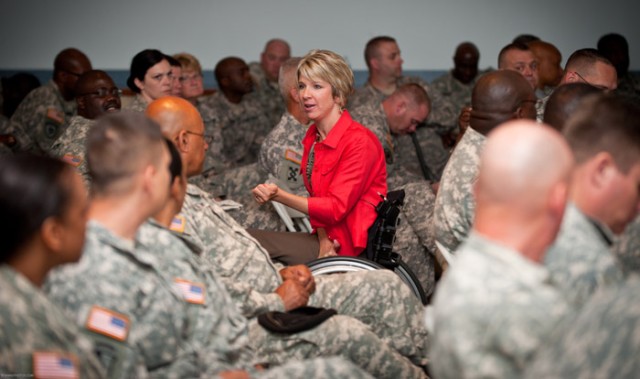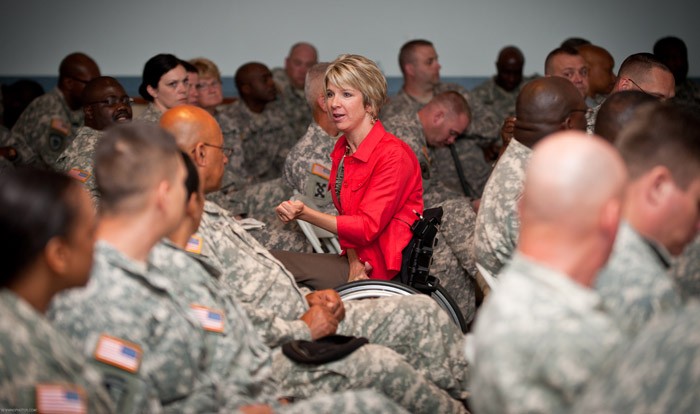FORT BENNING, Ga. - Leslie Ostrander knows about resilience. At age 4, Ostrander was paralyzed from the waist down in a fatal car accident on a county road between Columbus and Auburn, Ala., that killed her grandmother and injured her mother.
Her right hand was crushed and her vocal cords were damaged, diminishing her voice to a whisper. Doctors told her parents she would never walk again and would be completely dependent on someone for the rest of her life.
Today, the 36-year-old married mother of two has built her public speaking career on overcoming adversity. Confined to a wheelchair and armed with a wireless microphone, Ostrander invites her audiences to look beyond the barriers they place on their life - whether it's a doctor's bleak prognosis or their own self-doubt - and turn fear into action. Her corporate client list includes Aflac, Callaway Gardens, Safe Kids of Georgia and Toastmasters International. As a Christian motivational speaker, author and advocate for the disabled, Ostrander blazed her own path to a new normal.
"Life is hard but you can have an attitude that will make you more resilient. I don't want to be a 'good' story. I want to give you some things I've learned that helped me out," Ostrander said.
Ostrander shared her story Wednesday with hundreds of wounded warriors from Fort Benning's Warrior Transition Battalion. She's never been in the shoes of a wounded Soldier and cautioned that telling her story is only to illustrate examples of resiliency.
She's not looking for pity - she doesn't have room in her life for that.
"Growing up in a wheelchair wasn't easy. I would fight away thoughts constantly - you're broken, you don't fit in. I worried about what others thought ... but once I began to drop those negative thoughts I finally realized that this wheelchair did not have to define who I was. My legs had been stolen but my purpose was still fully intact," she said, addressing the Soldiers. "I learned that fear itself could put me in far greater bondage than I was in for my physical paralysis."
"Her message of resiliency is important to hear," said George Scruggs, a WTB training specialist.
"A lot of our Soldiers are facing challenges because they feel with their medical conditions they can no longer contribute to the fight. She's given a very inspirational message that you can overcome. We all have that ability within us to either stay down or get up and do something about it," he said.
Scruggs knows what it's like to have an uncertain future. He spent time at a medical hold battalion at Fort Stewart, Ga., in 2005 to heal from an injury. After retiring in 2007, the former Infantryman returned as a civil servant working with wounded warriors.
"Our Soldiers can take away that regardless of your plight you can still become a productive citizen and still do good things but it has to come from you, from within," he said.
Sgt. John Mabus said the presentation struck a chord and gave him some tools he will use.
"The idea to chisel away at things to form your masterpiece, your best form of you, was really motivating," he said.
Mabus, a 23-year Army law enforcement veteran, was injured during a training exercise last year. He was carrying a 200-pound Soldier in a fireman's carry when he tore his left calf muscle and fell. The crushing weight of the Soldier when he landed ruptured discs in his neck and back. He's endured three surgeries and understands his Army career is coming to a close. A single father of two, with a third in college, Mabus said the toughest part of being in the WTB is the uncertainty of what lies ahead.
"It's a struggle for me because I was on the road to being the best I could be and then I got hurt and it knocked me to my knees. Everything I'd worked hard for gone, I had to start over ... I know this is only going to end one way for me. My military career is over.
I'm looking beyond that door to the next chapter in my life," he said.
Mabus said Ostrander's story will stick with him, saying, "she could've given up and she didn't."
Her positive outlook, born of hard-won resiliency, encourages others to look beyond their limitations to see their potential, he said.
Ostrander's community involvement began in 1998 when she received the title of Ms. Wheelchair Georgia from the Mayor's Commission. She served as a liaison between disabled citizens and the Columbus Consolidated Government. She developed and implemented programs to improve quality of life for people with disabilities across the state, including disability education programs in Muscogee County schools.
In addition to her public speaking profession, Ostrander has a career in real estate with a focus on home modification improvements through local builders, realtors and contractors.
Ostrander is currently working with the Statewide Independent Living Council of Georgia to develop a Center for Independent Living. It would encourage those with disabilities to make their own choices and would work to open doors in the community to full participation and access for all. She published In His Hands in 2008, a memoir chronicling her path to personal growth.
For more information, visit www.lesliespeaks.com.


Social Sharing